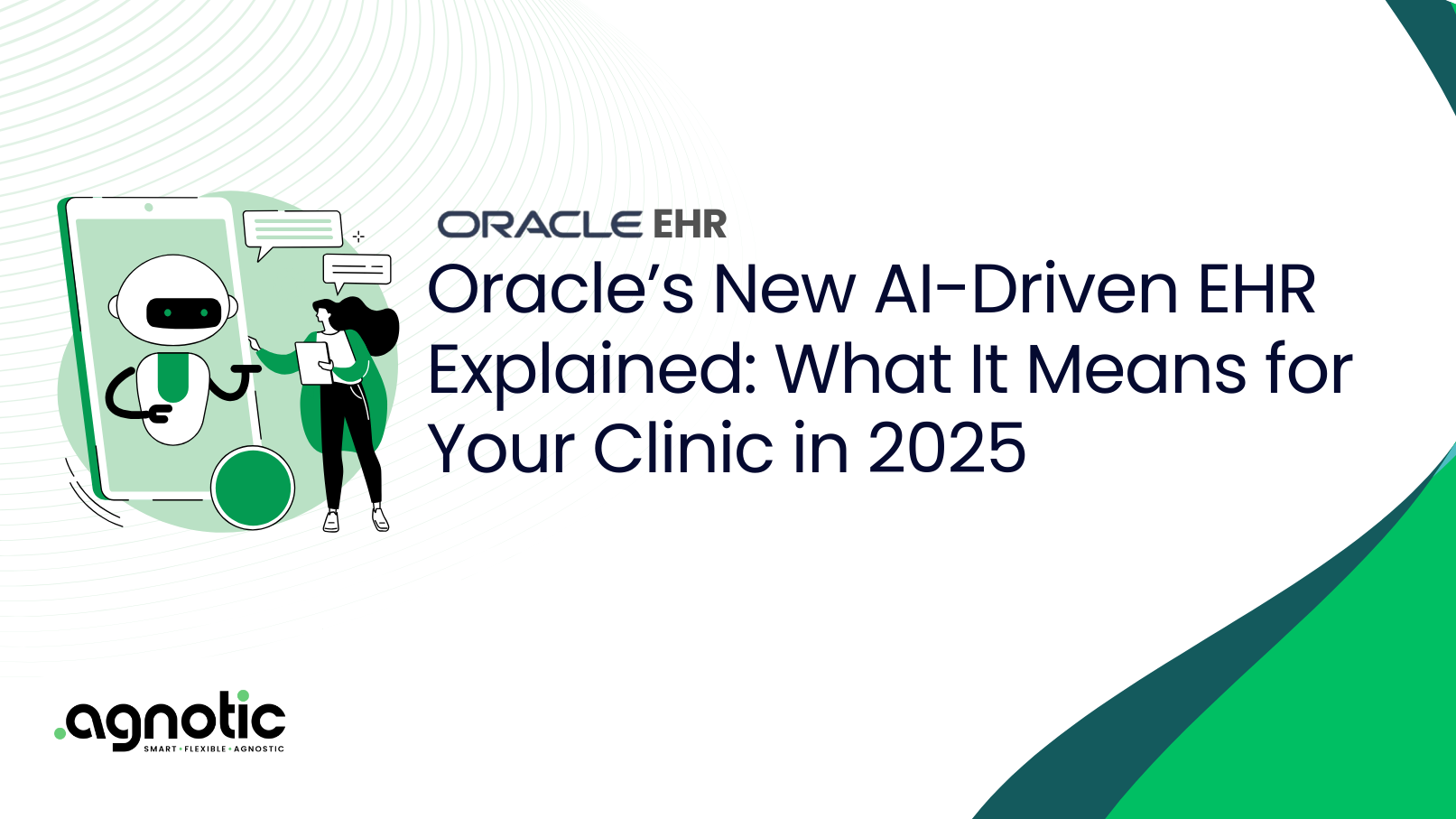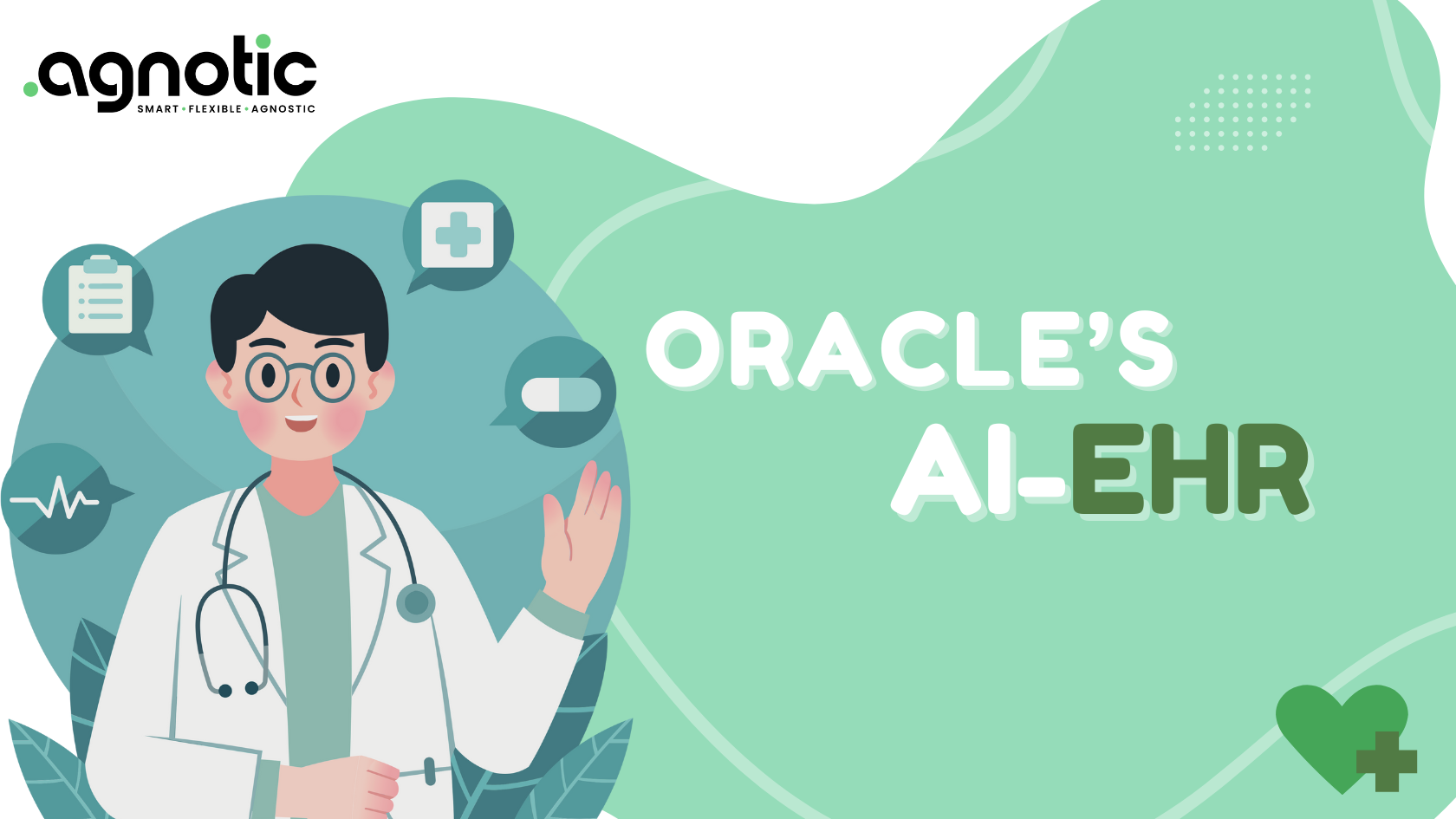Oracle’s New AI-Driven EHR Explained: What It Means for Your Clinic in 2025




Author: Agnotic Technologies • Last updated: August 2025 • Reviewed by Security & Compliance Lead

TLDR: Oracle’s new AI-driven EHR, launched in 2025, revolutionizes healthcare by offering a voice-activated, AI-powered system built on Oracle Cloud Infrastructure. It streamlines workflows, reduces administrative tasks, and enhances patient care, providing clinicians with an efficient way to access and manage patient data. For privacy-first builds, see our guide to HIPAA-compliant AI development.
Oracle’s AI-driven EHR represents a quantum leap forward in how healthcare providers access and manage patient data. Instead of relying on outdated, clunky systems, this platform leverages artificial intelligence to streamline workflows, automate documentation, and provide actionable insights in real time.
The EHR is voice-activated, meaning clinicians can simply speak to retrieve patient information. No more sifting through endless menus – just voice commands like, “Show me Robert’s allergies” or “What’s Emily’s blood pressure today?” The system interprets the request and presents the data immediately.
Oracle’s Clinical AI Agent is designed to work alongside clinicians, providing real-time insights and recommendations. It automates documentation, flags important clinical events, and supports decision-making by offering recommendations based on the latest data.
Oracle’s AI isn’t just surface-level. It’s designed to understand the context. This means it can look beyond simple data points and grasp the relationships between medications, conditions, and care pathways. For instance, if a patient’s prescribed drug may interact negatively with another medication they’re taking, the system flags this potential issue immediately, enabling the clinician to adjust their treatment plan.

The problem with most traditional EHR systems is their inability to adapt to the needs of modern healthcare. These systems have been built and rebuilt over the years, with new features bolted onto old infrastructure. While this has kept things running, it has also created a frustrating user experience.
Oracle took a different approach. Instead of merely tweaking the existing system, they started fresh. By designing their EHR on Oracle Cloud Infrastructure, they’ve created a flexible, scalable, AI-first platform that addresses the real needs of clinicians.
Think of the difference between a flip phone and a smartphone. While the flip phone worked, it was limited. A smartphone, however, changed everything. Similarly, Oracle’s new EHR is designed to revolutionize the way healthcare providers work, allowing them to focus on what matters most – providing excellent care.
The cornerstone of Oracle’s new EHR system is its voice-activated interface. Clinicians can speak naturally, asking for specific patient information, and the system will respond instantly. It’s like having a personal assistant who knows exactly what you need. This voice-first approach cuts down on the time spent navigating menus and gives clinicians more time to focus on their patients.
Oracle’s AI agents aren’t just tools – they’re virtual colleagues. These agents can flag unusual lab results, suggest next steps in patient care, and even generate documentation based on physician-patient interactions. Think of the AI agent as a highly skilled intern who works tirelessly, offering insights, flagging issues, and helping clinicians stay on top of their patient’s needs.
Oracle’s AI isn’t just surface-level. It’s designed to understand the context. This means it can look beyond simple data points and grasp the relationships between medications, conditions, and care pathways. For instance, if a patient’s prescribed drug may interact negatively with another medication they’re taking, the system flags this potential issue immediately, enabling the clinician to adjust their treatment plan.
Oracle’s new EHR doesn’t simply add AI features to existing workflows. Instead, the AI is embedded directly into the system, helping healthcare providers make more informed decisions in real time.
Instead of sifting through multiple records, Oracle’s AI generates concise, context-rich patient summaries that help clinicians get up to speed quickly.
The system can automatically suggest clinical orders based on real-time patient data and established guidelines, streamlining patient care.
Oracle’s EHR uses predictive analytics to identify gaps in care, risks of readmissions, and even financial concerns. By identifying these issues early, clinicians can take proactive steps to improve patient care.
Oracle’s system learns how clinicians work and adapts its workflows to their preferences. Over time, the system personalizes itself to improve efficiency and enhance the user experience.
Oracle’s new AI-driven EHR competes directly with Epic Systems, which has dominated the market for years. While Epic has a 42.3% market share in acute care hospitals, Oracle’s new AI-driven platform offers a compelling alternative.
Oracle’s approach is unique: instead of bolting on AI as a feature, they’ve embedded it at the core of the platform. Their voice-first, AI-powered system is designed for the modern healthcare environment, whereas Epic’s system, though powerful, has been retrofitted with AI.
Oracle’s focus on a cloud-native, scalable platform also gives it an edge over competitors. It’s built for the AI era, offering flexibility and scalability that Epic’s system can’t match.
While Oracle’s EHR is already making waves in the industry, its full potential has yet to be realized. The company’s roadmap includes:
For healthcare providers, Oracle’s EHR offers an opportunity to leapfrog legacy systems and embrace AI-powered workflows that improve patient care and clinician satisfaction.
Unlike traditional EHRs, Oracle’s system is designed from the ground up with AI at its core. It uses conversational AI to streamline workflows, automate documentation, and provide real-time clinical decision support.
No. Oracle’s AI-driven EHR is designed to augment clinicians’ work, not replace them. The AI handles administrative tasks, freeing up doctors to focus on patient care.
Oracle uses military-grade encryption and is fully HIPAA-compliant.
Built on Oracle Cloud Infrastructure, the system ensures that patient data is secure and always accessible.
Ambulatory providers in the U.S. can begin using Oracle’s EHR in 2025, with acute care features expected to be available by 2026.
While exact pricing is not disclosed, the cloud-native design of the platform typically reduces upfront costs. Smaller clinics may also benefit from flexible subscription-based pricing.
By reducing the administrative burden on clinicians, Oracle’s EHR allows for more personalized care and direct interaction with patients. It also helps clinicians make faster, more accurate decisions.
see: ONC’s HTI-1 Certification Program, USCDI data classes, and Cures Act Information Blocking.
Oracle’s new AI-driven EHR system marks a major milestone in healthcare technology. It addresses the shortcomings of traditional EHRs by integrating AI at every layer of the platform, from voice-first navigation to predictive analytics and clinical decision support.
By adopting Oracle’s AI-driven EHR, healthcare organizations can improve clinician efficiency, reduce burnout, and enhance patient care. This system represents the future of healthcare: intelligent, adaptable, and ready for the AI era.
Healthcare organizations looking to move away from legacy systems should consider Oracle’s AI-driven EHR as a future-proof solution that embraces the digital transformation of healthcare. If you’re planning healthcare product development
or a net-new EHR build, aligning early on privacy and compliance is critical—start with our HIPAA guide.
Discover how Oracle’s AI-driven EHR can streamline workflows, reduce clinician burnout, and enhance patient care at your organization.
If you’re evaluating an EHR build or broader healthcare product development roadmap, our team can help you plan a HIPAA-first architecture—read our HIPAA checklist.
At Agnotic Technologies, we don’t just build software; we engineer the future of AI. As a leading native AI technology company, we specialize in developing cutting-edge AI SaaS products that accelerate innovation from ideation to final deployment. We work with enterprises and startups alike, turning complex challenges into streamlined, intelligent solutions.
Our team is dedicated to building scalable AI platforms designed to seamlessly integrate with your existing workflow, so you can focus on what matters most: growing your business. Whether you’re looking to enhance operational efficiency, improve customer experiences, or make data-driven decisions, we’ve got the expertise to make it happen.